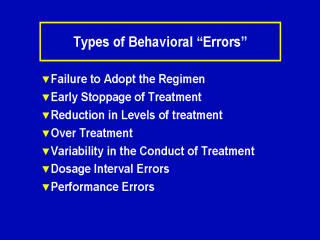 |
The kinds of errors that we pick up with people include: not
just failure to adopt the regimen or early stoppage of treatment but reduction in levels
of treatment, such as exercising only once a week instead of three or four times a week;
taking medication but frequently missing episodes of dosage; over treatment, and I think
we see that in both the exercise arena and in the medication arena; considerable
variability in the conduct of treatment, which is probably the most common problem that we
find and at least for pharmaco-therapy it impacts the clinical outcome from the
medication; considerable dosage interval errors, as when something needs to be taken in
certain periods within a certain window apart from the other dose; and then just general
performance errors. To take an extreme one, I'm reminded of a colleague who was studying
patients who were taking inhaled medications for asthma. She was using an electronic
monitor on patients that were prescribed three asthma doses, maybe every four hours. The
prescription said to leave a minute or so between puffs, but patients were allowing only
seconds as intervals and were not getting therapeutic benefits. They were having some
considerable performance error in how they were using their inhaler. Those kinds of
problems are not uncommon. |
